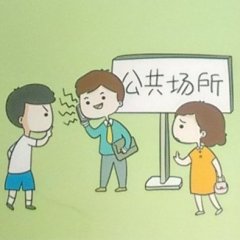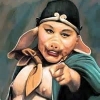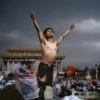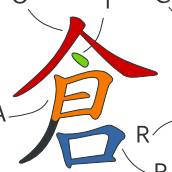
天边的额吉 seems like a really odd name for a brand, possibly something to do with the Mongolian connection...?
Anyone know the story behind this?
- Read more...
- 4 comments
- 1669 views

 143
143
 85
85
 61
61
 11
11
 8
8
 8
8
 6
6
 4
4
 4
4
 2
2
 2
2
 2
2
 1
1

天边的额吉 seems like a really odd name for a brand, possibly something to do with the Mongolian connection...?
Anyone know the story behind this?

Posters like this have started to appear all over our college campus as COVID vaccinations are rolled out to students and staff.
我们一起打疫苗
一起苗苗苗苗苗
I presume there's some kind of cultural reference in 苗苗苗苗苗... is it from a children's song or something?

By ChTTay,
I like the slogan and art of this one. Beijing subway Dec 23rd 2020.

By mungouk,
OK I give up... what on Earth is going on here?
Obviously it's 咖啡 but I can't decipher the rest of that weird font.

By mungouk,
Again, not really a sign as such but on a simple level I love the way this document's function affects the way it looks.
Plus it also shows hanzi going vertically as well as horizontally, which is a topic that come up from time to time.
Question: What's the other script, and what kind of document is this? (Click picture to enlarge.)
Caption: "A petition against changes to education policy signed by all the residents of Dalanhua Village, Chifeng Municipality, Inner Mongolia.
The circular style imitates that of duguilang resistance groups in pre-revolutionary times. Photo via Made in China."
From Ethnic Mongols protest Beijing’s push for Mandarin-only classes, SupChina, 1 Sep 2020.
https://supchina.com/2020/09/01/ethnic-mongols-protest-beijings-push-for-mandarin-only-classes/

By mungouk,
Well, it's a 短信 rather than a sign as such, but still a signifier of something or other.

By Tomsima,

By mungouk,
One of the first things I noticed when I moved to Beijing is the very big red and white banners which appear to have propaganda/slogans on them.
I can translate them literally, but I wonder if there's a proper way of expressing them in English which has the right tone and vocabulary to make them sound like the voice of the Party?
By abcdefg,
Best for beginners
If you live in China, you have probably seen something similar to this in the last year or so. My snapshots are from this morning.
What is this about? The photo on the left provides detail. The photo on the right provides context. (Click to make the photos larger, to make the small text legible.)
What two words does Chinese turn into this "efficiency contraction," as shown in the bottom of the frame? -- 环保。When starting out learning the language in a practical way, beyond the textbook, these things can throw you for a loop because they often are not in the dictionary. (Click to see the answer.)
环境
保护
And here's the give-away in pictures in case you are still wondering.

By anonymoose,
From 梅县

By mungouk,
Car Park at Yu Long River 遇龙河 near Yangshuo 阳朔, Guangxi.

By roddy,
The main menu is entirely English and standard cafe burgers and breakfasts. Not been in yet, but maybe next time I'm passing.

By Publius,
Can you guess what kind of business they are in?

By ChTTay,
... get up fast

This fourth and final entry in the anti-mobile phone campaign on the Chongqing subway takes the famous "Wu Song Defeats the Tiger" (武松打虎) story from the The Water Margin (水浒传) as its subject.
Quote这样还能打老虎吗?
吊睛白额猛虎袭,好汉却在玩手机
打虎英雄变手机痴汉,紧要时刻怎轻易低头?
为了自身的安全与健康,请合理正确使用手机。
It says when the ferocious tiger ("吊睛白额猛虎") attacks ("袭"), the warrior is busy playing with his phone ("好汉却在玩手机"). It goes on to state that the hero has become a phone zombie/idiot ("打虎英雄变手机痴汉"), and asks how he can allow himself to become so absorbed with his phone during such a vital moment ("紧要时刻怎轻易低头?"). As with the previous three adverts, it requests that people use their phones wisely ("请合理正确使用手机"), so as not to endanger their health and safety ("为了自身的安全与健康").

By mungouk,
OK I know weird translations of food are a cheap shot, but I figured someone must know the story behind this one...
Possibly even the precursor to women laughing alone with salad?
Here are some good-to-know words from the small print near the bottom:
Caution: This spoiler gives it all away.

The third in the series of Chonqing subway ads encouraging moderate smartphone usage is a play on the meeting of 刘备, 关羽 and 张飞 in the Romance of the Three Kingdoms story (三国演义).
Quote这样还能结义吗?
不求同年同月同日生,却想同月同日玩手机
桃园侠士变手机挚友,肝胆相照却成为过去?
为了自己的朋友和友情,请合理正确使用手机。
In the legendary meeting, the three strangers take an oath to become brothers, and make a pact to die on the same day ("不求同年同月同日生,只愿同年同月同日死"). In the ad, instead of swearing to die on the same day, the three men express a desire to play on their phones on the same day ("却想同月同日玩手机"). In the third sentence the ad asks, if in future people become mere internet friends rather than true brothers ("桃园侠士变手机挚友"), will the kind of loyalty as showed in the story ever have a chance of existing? ("肝胆相照却成为过去?")
It ends by encouraging intelligent use of smartphones ("请合理正确使用手机") for the sake of your friendships ("为了自己的朋友和友情").

The 2nd in the series of public adverts encouraging intelligent of smartphones on the Chongqing subway, this one takes its inspiration from 红楼梦 (Dreams of the Red Chamber).
Quote这样能相遇吗?
有缘千里来相会,面对面来玩手机
有情人终成眷属,玩手机终成陌路。
为了自己的亲人和爱人,请合理正确使用手机。
It asks whether the protagonists would have met if they had had phones to play with. The second sentence is a play on a traditional Chinese saying: "有缘千里来相会, 无缘对面不相逢" (if it is fated to be then it will happen even if separated by one thousand miles, if it's not fated to be then it won't happen even if you are face to face). Instead, the second part in the adverts reads "面对面来玩手机" (side by side but playing on their phones).
The first half of the third sentence is also a traditional Chinese saying: 有情人终成眷属 (if there is love between them then they will eventually become husband and wife). The second part is new and says that if they play on their mobile phones then they will remain strangers (玩手机终成陌路). It ends by exhorting the readers to use their phone responsibly (合理正确使用手机) for the sake of their loved ones (为了自己的亲人和爱人).

By Publius,
蚝 is #4882 on Junda's frequency list. The traditional form is 蠔 #8238.
It means 'oyster', not a high priority unless you live in Guangdong.
And do you think the simplification makes it easier to learn?

By murrayjames,
Spotted near a Hunanese shaokao stand off South Pudong Road.

While travelling on the Chongqing subway last summer, I noticed a series of public adverts designed to encourage healthy use of smartphones, all based on the 四大名著 (four great works of Chinese literature). Being both a lover of the 四大名著 and a hater of smartphones, these humourous ads caught my attention enough for me to want to take a photo of each. This first one is based on 西游记 (Journey to the West).
Quote这样还能取经吗?
贫僧从东土大唐而来,去往西天充电玩手机
取经圣僧成手机迷弟,行万里路怎忘记初心?
为了自身的梦想与目标,请合理正确使用手机。
It asks if the monk (贫僧/圣僧) is travelling all the way to the west just to recharge and play with his phone ("去往西天充电玩手机"). Has he forgotten his original aim (初心) of bringing back the scriptures (取经)? It ends by encouraging people to use their phones in moderation ("合理正确使用手机") in order not to be distracted from achieving their goals and dreams ("为了自身的梦想与目标").

By mungouk,

By roddy,
Thanks to @mungouk for the picture.
On your way to work one morning, something goes wrong and you are directed to this sign.
1) What method of transportation are you trying to use?
2) What are your two options now?
3) And an easily-guessable one - what phone number might you need to phone for help?

By ChTTay,
When the yellow light lighting the door dooring. Simple!
Surprising (or not) that the Beijing subway still has these kinds of errors.